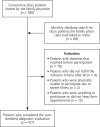Causes of persistent dizziness in elderly patients in primary care
- PMID: 20458102
- PMCID: PMC2866716
- DOI: 10.1370/afm.1116
Causes of persistent dizziness in elderly patients in primary care
Abstract
Purpose: Although dizzy patients are predominantly seen in primary care, most diagnostic studies on dizziness have been performed among patients in secondary or tertiary care. Our objective was to describe subtypes of dizziness in elderly patients in primary care and to assess contributory causes of dizziness.
Methods: We performed a cross-sectional diagnostic study among elderly patients in the Netherlands consulting their family physician for persistent dizziness. All patients underwent a comprehensive evaluation according to a set of diagnostic tests that were developed during an international Delphi procedure. Data for each patient were independently reviewed by a panel consisting of a family physician, a geriatrician, and a nursing home physician, which resulted in major and minor contributory causes of dizziness.
Results: From June 2006 to January 2008, we included 417 patients aged 65 to 95 years. Presyncope was the most common dizziness subtype (69%). Forty-four percent of the patients were assigned more than 1 dizziness subtype. Cardiovascular disease was considered to be the most common major contributory cause of dizziness (57%), followed by peripheral vestibular disease (14%), and psychiatric illness (10%). An adverse drug effect was considered to be the most common minor contributory cause of dizziness (23%). Sixty-two percent of the patients were assigned more than 1 contributory cause of dizziness.
Conclusions: Contrary to most previous studies, cardiovascular disease was found to be the most common major cause of dizziness in elderly patients in primary care. In one-quarter of all patients an adverse drug effect was considered to be a contributory cause of dizziness, which is much higher than reported in previous studies.
Figures
References
-
- Jönsson R, Sixt E, Landahl S, Rosenhall U. Prevalence of dizziness and vertigo in an urban elderly population. J Vestib Res. 2004;14(1): 47–52. - PubMed
-
- Tinetti ME, Williams CS, Gill TM. Dizziness among older adults: a possible geriatric syndrome. Ann Intern Med. 2000;132(5):337–344. - PubMed
-
- Colledge NR, Wilson JA, Macintyre CC, MacLennan WJ. The prevalence and characteristics of dizziness in an elderly community. Age Ageing. 1994;23(2):117–120. - PubMed
-
- Sloane P, Blazer D, George LK. Dizziness in a community elderly population. J Am Geriatr Soc. 1989;37(2):101–108. - PubMed
-
- Sloane PD, Baloh RW. Persistent dizziness in geriatric patients. J Am Geriatr Soc. 1989;37(11):1031–1038. - PubMed
Publication types
MeSH terms
LinkOut - more resources
Full Text Sources
Medical

